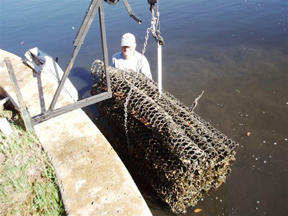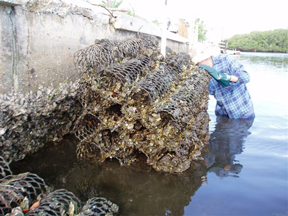

 |
||||||
 |
||||||
Estuary Program Awards $160,000 in Community Grants
More than $160,000 in community grants – funded through sales of the Tampa Bay Estuary license plate commonly known as the “Tarpon Tag” – has been awarded to 25 community groups.
A record-breaking 52 applicants submitted applications to the Tampa Bay Estuary Program requesting funds for projects that directly involve citizens in restoring and improving Tampa Bay. TBEP’s Community Advisory Committee evaluated the grant proposals, recommending 25 for full or partial funding. Revenues raised through license plate sales can only be used for projects such as the Mini-Grant program that directly help to implement bay restoration goals.
For the first-time ever, TBEP Mini-Grants funded projects that target on-the-ground restoration involving local community groups for maximum awards of up to $10,000 each. Those four projects are:
Oyster Reef Shoreline Stabilization and Restoration
MacDill Air Force Base, $10,000
Civilian and military volunteers will install oyster domes along the southeastern shoreline of the base to stabilize approximately 1,000 feet of shoreline.
Bay Scallop Restoration of Lower Tampa Bay
Terra Ceia Village Improvement Association, $9,600
Designed to reestablish bay scallop populations in Lower Tampa Bay, this restoration effort will use an innovative stock enhancement strategy including the collection of brood stock scallops, building a hatchery, then rearing and releasing scallop larvae into two project sites. Volunteers also will conduct pre- and post- restoration surveys every three months for the project duration.
Borrow Pit Transformation: Re-planting a Newborn Lagoon at Robinson Preserve
Manatee County Board of County Commissioners, $8,840
An existing borrow pit at Robinson Preserve has been expanded into a tidal lagoon and Mini-Grant funds will help restore it with native plants. The project will include plantings by volunteers, development of a tidal plant nursery that will also serve as an outdoor classroom, creation of a curriculum and ongoing public tours and workshops.
Lake Seminole Native Plant Restoration
Pinellas County Department of Environmental Management, $10,000
The restoration of Lake Seminole continues with the installation of native aquatic vegetation and upland plants, including sand cord grass, live oak trees, soft rush, duck potato and other beneficial species along the southern and western shorelines of Lake Seminole.
Other 2007 recipients are:
Hillsborough County
Dune Stabilization Planting
Egmont Key Alliance, $2,550
Designed to stabilize new beach sand placed by the U.S. Army Corps of Engineers in September, this project calls for planting native Florida coastal vegetation including sea oats, railroad vine and beach sunflower.
Cypress Creek’s Outdoor Lab
Cypress Creek Elementary School, $4,285
Students will construct a mangrove nursery, plant mangrove seedlings and improve the school’s existing cistern system. An overview of the program also was presented as a service learning exhibit at the Florida State Fair in February.
 |
 |
|
A 2005 Tampa Bay Estuary Program mini-grant to the South Shore Diamond Habitat Award Program helped to fund a pilot project that evaluated the feasibility of enhancing seawalls using man-made oyster reefs. Oyster biomass increased the weight of the reef by more than 200 pounds as the filter-feeding shellfish colonized the artificial reef over 15 months. |
Migratory Bird Surveys at Cockroach Bay Preserve
Quest Ecology, Inc., $7,500
Using a combination of point counts and mist nets, Quest Ecology will monitor migratory birds at Cockroach Bay Preserve, including canopy, soaring and forest-dwelling birds. Information collected from the surveys will help develop a baseline species inventory of migratory birds using a restored and created preserve to serve as a model for future enhancement projects.
Hillsborough River State Park
River, Watersheds and Bays Education Program, $4,185
An interactive curriculum and hands-on program using an outdoor, field-based approach to education will be written to engage students in learning about the upper Hillsborough River and its impact on Tampa Bay. Targeted school groups will also learn about other important topics including the water cycle, aquatic invasive species, and the impact of runoff from homes, agriculture and paved spaces such as parking lots.
Manatee County
McLewis Bayou Bank Restoration
Saint Stephen’s Episcopal School, $4,263
Students at St. Stephen’s Episcopal School will restore the banks of McLewis Bayou in Manatee County by removing invasive plants and planting native plant species. Students will also post project data on the school website with a section on resources for developing similar programs in the area.
Cultivating Kids
Manatee County Friends of Extension, $4,100
This project at Anna Maria Elementary School will feature multiple gardens for children including a sensory garden for kindergarten through second graders, a butterfly garden for third graders, a vegetable garden for fourth graders and an additional garden with a nature trail for all grades. Rain barrels, a website presentation and curriculum from the Junior Master Gardeners Program also will be included.
Pinellas County
Fort DeSoto Park Trail Educational Signage
Pinellas County Parks & Recreation Dept., $5,629
Mini-Grant funds will be used to install permanent interpretive educational signage along three trails, eliminating printed guides and the litter problem they cause.
Fort DeSoto Beach Dune Enhancement
Friends of Fort DeSoto, $7,500
Volunteers will plant sea oats along the west end of Mullet Key in Fort DeSoto and then install educational signs explaining the importance of coastal dune systems.
Canterbury School Habitat Restoration and Education Project
Canterbury School of Florida, $6,575
Students at this school in St. Petersburg will restore habitat in two campus locations by planting marsh grass along a creek that runs through the campus and turning a lawn area into a native species garden. Plants will be labeled, and lesson plans and activities will be created to teach students the value of natural ecosystems.
Makeover at Crescent Lake: Creating a Healthier and Bio-Diverse Lake
Crescent Lake Neighborhood Association, $6,689
The makeover of Crescent Lake in St. Petersburg will include removal of trash, debris and invasive plants, planting of native plants and installation of storm drain markers and educational signs.
Harbor Day Initiative
Student Environmental Awareness Society (SEAS) at USF St. Petersburg, $735
The Harbor Day Initiative is a campaign by USF St. Petersburg students, faculty, staff, affiliates and community members to clean up Bayboro Harbor and promote awareness of issues affecting our waterways and coastal environments.
Putting Together the Pieces of our Watershed
Southside Fundamental Middle School, $7,332
Creation of an outdoor classroom will provide educational opportunities for students, parents and the community to learn about stormwater runoff and its effects on our environment. Students will develop an area of their campus to showcase native plants and good drainage techniques, plus create a brochure to educate the school and neighborhood about water-wise principles.
The Rainbow at Mars Native Plant Pocket Park
Pinellas Chapter of the Florida Native Plant Society, $7,500
A small parcel in Clearwater – once developed but now vacant – will be transformed into a pocket park featuring native plants. The project will include both a butterfly garden and a winding path through a landscape of native plants with informational signage.
Habitat Rehabilitation in Lake Seminole Park
Boy Scouts of America, $7,364
An Eagle Scout project, this Mini-Grant will purchase native plants to install along the shoreline around the observation platform at the park. Volunteers and members of the scout troop will work with 15-year-old Cody Jordan on the project.
Clam Bayou Marine Education Center’s Coastal Restoration Project (Phase II)
USF College of Marine Science, $7,500
Grant funds for Phase II of this project will continue restoration efforts at the Marine Education Center including teacher workshops, addition of three new schools to the existing program, planting and signage of new native plants and design and maintenance of a native Florida herb and wildflower garden.
McKay Creek Pond Native Planting
Pinellas County Extension & Florida Botanical Gardens, $7,434
An inventory of all flora in and around the pond at the Florida Botanical Gardens will be taken, with the long-term goal of developing a restored pond area with native plants and educational signage to teach volunteers and visitors about the plants and the role they play in both the habitat and the watershed.
School Pond Restoration
St. Paul’s School, $5,973
Teachers and students will work together to restore the shoreline of the stormwater pond located on the school campus which drains directly into Allen’s Creek in Clearwater. They will remove exotic plants and replant with native plants, plus conduct a neighborhood outreach campaign.
Lake Egret Restoration and Revegetation
Neighborhood “E” (The Landings) Homeowner Association, $7,264
This St. Petersburg neighborhood association will restore the eroded banks of Lake Egret by stabilizing and strengthening the existing shoreline with native plants. Although designed primarily as a restoration project, it also includes strong educational components with plans to document the process and give presentations to other interested groups.
Wetlands Ecosystem Exhibit Water Quality Monitoring & Education
Science Center of Pinellas County, $7,500.00
Building on its newly created wetland exhibit, the Science Center will inform students of all ages about the importance of wetlands using real-time data collected from monitoring equipment located directly in the exhibit.
Projects Impacting
Multiple Counties:
Baseline Data for a Restoration Plan of Islands Along the Pinellas County Coast
Eckerd College, $7,500
Dr. Teresa Restom Gaskill will direct this initiative designed to analyze the distribution of plants on islands in Pinellas, Manatee and Hillsborough counties, resulting in the publication of guidelines for island restoration.
Identification and Control of Brazilian Pepper in the Tampa Bay Area
TECO’s Manatee Viewing Center, $2,740
An update of the “Beautiful But Bad” brochure created many years ago to educate Tampa Bay residents about the harmful effects of Brazilian pepper plants will focus on teaching homeowners how to effectively remove Brazilian pepper from their own properties.

Future of Florida Farming May Be Rising in Dover
Don Whyte: Greening the Vision of Development
Estuary Program Awards $160,000 in Community Grants
Mote's Founding Director Celebrates her 85th Birthday
The Pier Aquarium Prepares For its Grand, Grand, Grand Reopening